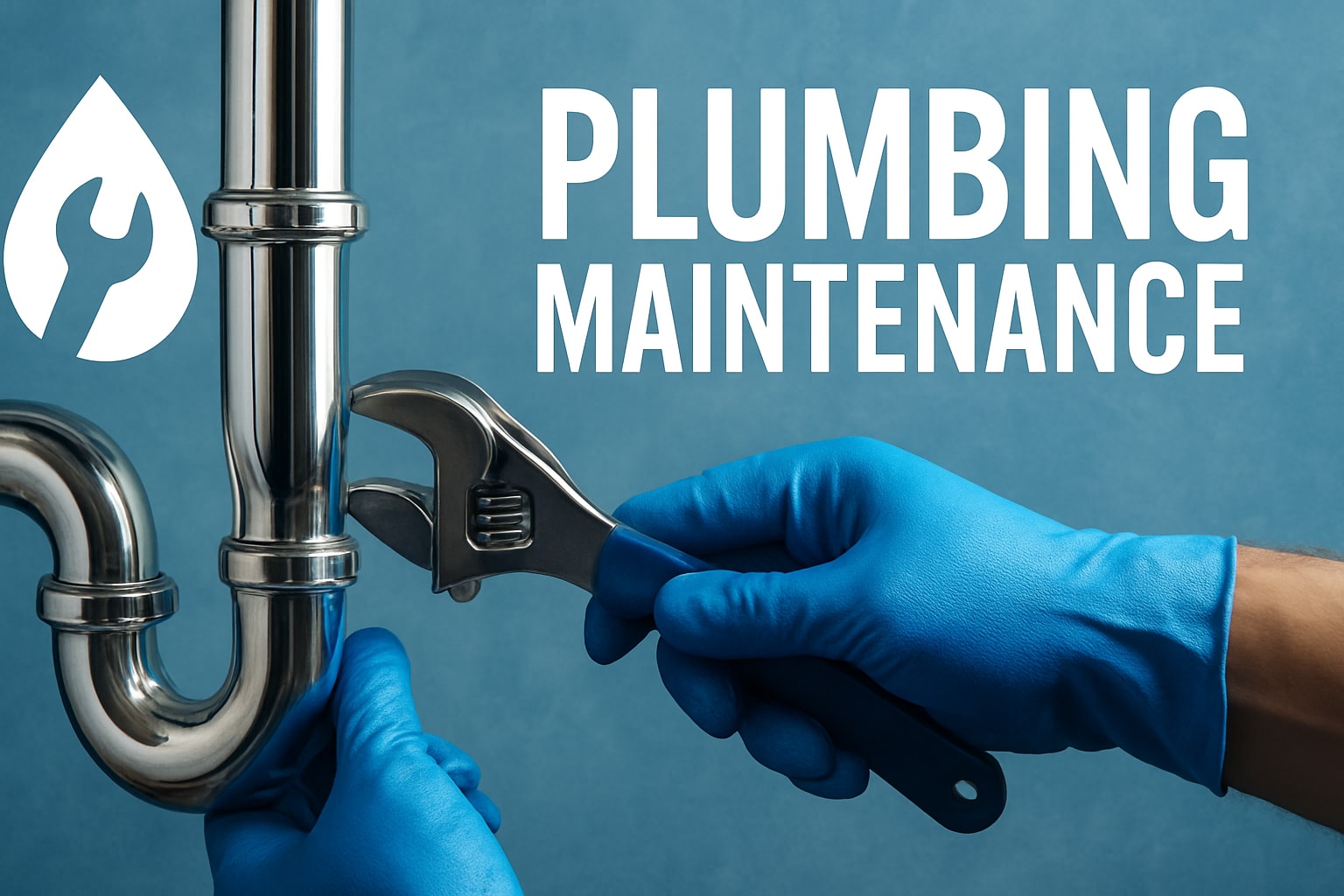Ever woken up to a flooded bathroom or ice-cold shower? Plumbing surprises like these can throw off your whole day. That’s why keeping up with plumbing maintenance work is so important, especially as we head into 2025. This guide will show you simple steps to prevent big headaches, save money, and keep your home running smoothly. We’ll break things down in a way that’s easy for anyone to follow. If you have any questions, just call, chat, or email us—we’re always happy to help!
Why Plumbing Maintenance Matters in 2025
Plumbing might not be the first thing you think about in your home, but it plays a huge role in your daily comfort and safety. If you have ever had to mop up a leak in the middle of the night or take a cold shower, you know how quickly plumbing issues can turn your day upside down. Understanding the importance of plumbing maintenance work can save you headaches, money, and stress in 2025.
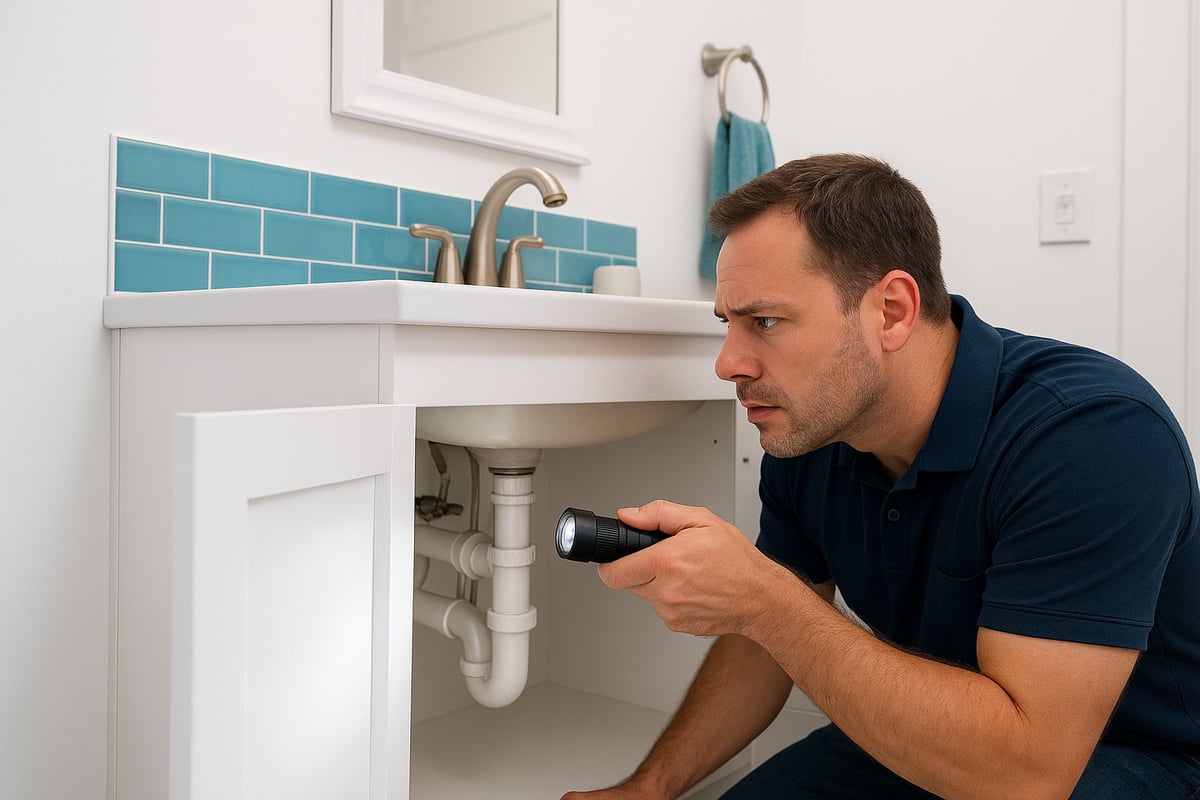
The Cost of Neglecting Plumbing Maintenance
Ignoring plumbing maintenance work can lead to serious problems. Leaks, water damage, and mold are some of the most common issues. Just imagine coming home to find your bathroom floor soaked or your ceiling stained from a hidden pipe burst. According to the Insurance Information Institute, the average water damage claim in the U S is over 10,000 dollars.
Neglecting plumbing maintenance work also wastes water, which means higher utility bills and harm to the environment. When water sits in your walls or floors, it can lead to mold and mildew. This can trigger allergies or even cause breathing problems for your family.
For example, one Atlanta homeowner faced a burst pipe after skipping regular plumbing maintenance work. The repair cost thousands, and the family had to leave their home for days while repairs were made. Taking simple steps now can help you avoid these stressful situations.
Benefits of Regular Plumbing Maintenance
Doing plumbing maintenance work on a regular schedule brings lots of benefits. First, it helps your pipes and appliances last longer, so you do not have to replace them as often. This means more money in your pocket and less worry about surprise breakdowns.
Regular plumbing maintenance work can also improve your water quality and keep your water pressure strong. You will notice fewer drips, cleaner water, and smoother showers. Plus, homes that stay on top of plumbing maintenance work often keep their property value higher.
Another bonus is peace of mind. You will have fewer emergencies and less stress because you know your plumbing is in good shape. Simple checks and fixes can make a big difference for your family’s comfort and budget.
Key Plumbing Challenges for 2025
Plumbing maintenance work is changing in 2025 because homes are facing new challenges. Many houses have aging pipes that can break or corrode. New building codes and eco-friendly rules mean you might need to upgrade your system to meet the latest standards.
Smart plumbing devices, like leak detectors and water monitors, are becoming more popular. These tools help you spot problems early and save water, which is great for your wallet and the planet. According to Plumbing Industry Statistics 2025, more homeowners are choosing smart fixtures and eco-friendly upgrades each year.
In Atlanta, you also need to watch out for hard water, tree roots getting into pipes, and sudden weather changes. All these things can make plumbing maintenance work even more important. If you ever have questions about how to handle these challenges, you can always call, chat, or email us. We are always glad to help!
Step-by-Step Plumbing Maintenance Checklist
Keeping up with regular plumbing maintenance work can feel like a big job, but it is actually pretty simple when you break it down. With the right routine, you can spot small problems before they turn into big headaches. This checklist will walk you through what to do each month, season, and year, plus how to be ready for emergencies. Ready to become your home's plumbing hero? Let’s dive in!
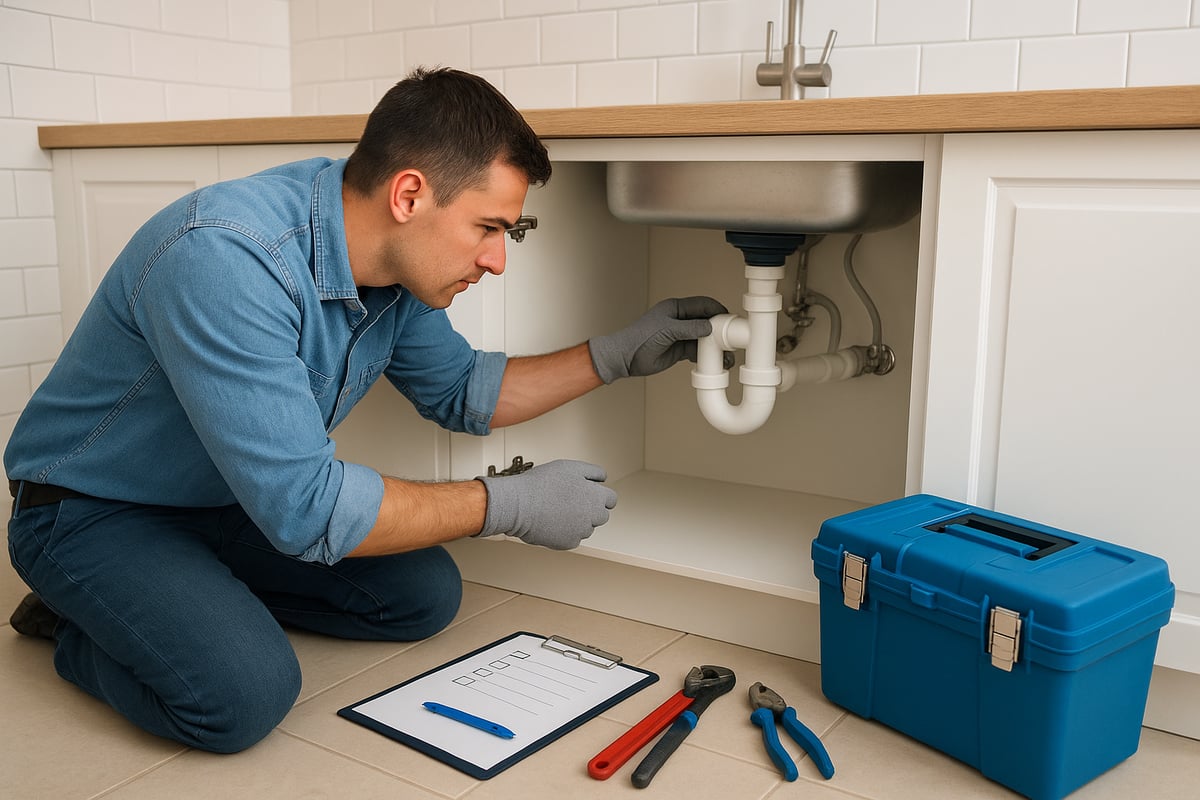
Monthly Plumbing Checks
Monthly plumbing maintenance work is all about catching leaks, drips, or little surprises before they grow. Think of it like giving your house a quick health check.
- Look at every faucet and showerhead in your home. Do you see or hear any drips?
- Peek under your sinks. If you spot moisture, puddles, or mold, that is a sign to act.
- Test the water pressure in your kitchen, bathrooms, and laundry room.
- Pour baking soda and vinegar down your drains to help keep them clear and fresh.
- Check pipes you can see for rust or greenish spots, which mean corrosion could be starting.
Here is a fun tip: turn monthly checks into a family game. Who can find the most “healthy” faucets? Keeping up with plumbing maintenance work each month is the best way to stop sneaky leaks and save money on repairs.
Seasonal Plumbing Tasks
Every season brings new challenges for your plumbing. A little plumbing maintenance work four times a year can prevent big, messy problems.
- Winter: Wrap any pipes that are outside or in cold spaces with insulation. Disconnect hoses from outside taps. Check for chilly drafts near pipes.
- Spring: Make sure your sump pump works, especially if you have a basement. Turn on outdoor faucets and look for leaks. Double-check for any damage from cold weather.
- Summer: Flush your water heater to remove mineral buildup. Test your sprinklers and look for soggy spots in the yard, which could mean a leak. Inspect sewer lines if you notice slow drains.
- Fall: Clean out gutters so water flows away from your home. Test all shut-off valves to make sure they turn easily. Add extra insulation to pipes that will face the cold.
Did you know that 30% of plumbing emergencies happen during seasonal changes? That is why following this plumbing maintenance work checklist with the seasons is so important. If you ever feel stuck, just call, chat, or email us. We are always glad to help.
Annual Plumbing Maintenance
Once a year, your home deserves a full plumbing checkup. Annual plumbing maintenance work keeps everything running smoothly and helps you catch problems you might miss during your regular checks.
- Inspect your water heater for sediment buildup and strange noises. If needed, flush it to keep it efficient.
- Find your main water shut-off valve and test it. Make sure you can turn it off quickly in an emergency.
- Schedule a professional drain cleaning and camera inspection to spot hidden blockages.
- Use your water meter to check for leaks you cannot see. If the dial moves when no water is running, you might have a hidden leak.
- Replace old washers, supply lines, and any brittle hoses. This simple step can prevent big leaks.
Want to see how a real-life annual Comprehensive Plumbing Maintenance Project looks? Check out this Atlanta home where a full tune-up saved the owner from future repairs. Remember, you can always reach out to us with questions about your annual plumbing maintenance work.
Emergency Preparedness Steps
No one likes surprises, especially when it comes to water on the floor. Being ready for emergencies is a crucial part of plumbing maintenance work. Here is how you can prepare:
- Know exactly where your main shut-off valve is located. Can everyone in your house find it in a hurry?
- Keep your plumber's contact info posted on the fridge or saved in your phone.
- Teach your family what to do if water starts to gush or a toilet overflows. Quick action keeps damage small.
- Keep a few towels, a bucket, and a flashlight in an easy-to-reach spot for fast clean-up.
A quick shut-off can save you thousands of dollars in water damage. If you ever feel unsure, just call, chat, or email us. We are always glad to help you with any plumbing maintenance work emergency.
Essential Tools & Supplies for DIY Plumbing Maintenance
Every homeowner can tackle basic plumbing maintenance work with just a few simple tools and supplies. If you ever feel unsure or need help, remember you can always call, chat, or email us—we are happy to answer any questions.
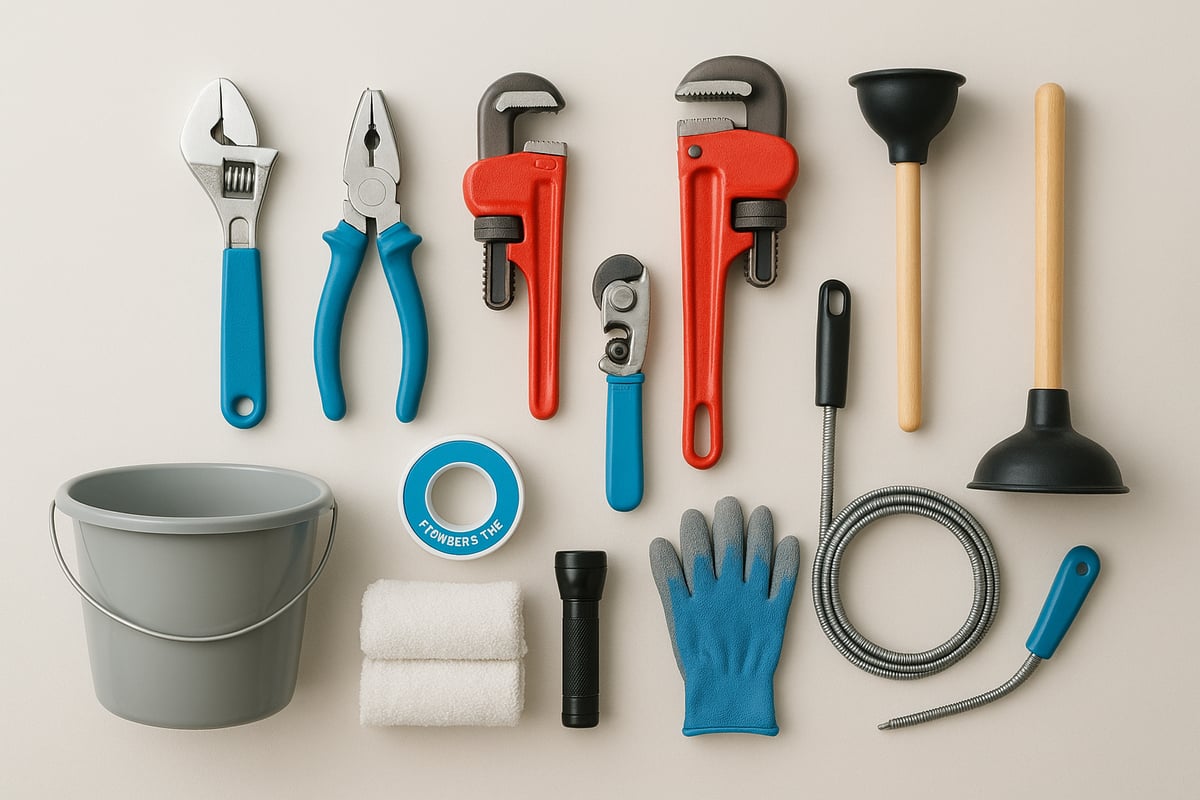
Basic Plumbing Toolkit
To get started with plumbing maintenance work, you need the right tools. Here are the must-haves for your toolkit:
- Adjustable wrench: Great for tightening and loosening nuts and bolts.
- Pliers: Useful for gripping and turning pipes or fittings.
- Pipe wrench: Perfect for larger pipes.
- Plumber’s tape: Helps seal pipe threads and stop leaks.
- Pipe cutter: Makes cutting pipes easy and clean.
- Plungers: Both cup and flange types for sinks and toilets.
- Flashlight: Handy for seeing under sinks or in dark areas.
- Bucket and towels: For catching water and cleaning up.
- Gloves: Protect your hands during messy jobs.
- Drain snake: Removes tough clogs from pipes.
Even a simple $10 plunger can save you from a $200 service call. Having these tools ready makes plumbing maintenance work much easier and less stressful.
Supplies to Keep on Hand
Besides tools, you’ll want to stock up on a few supplies so you’re always ready for plumbing maintenance work. These items help you handle quick fixes and prevent bigger problems:
- Replacement washers and O-rings: Stop leaks in faucets and hoses.
- Extra supply hoses: Replace old or cracked ones before they burst.
- Non-toxic drain cleaner: Baking soda and vinegar work well and are safe for pipes.
- Pipe insulation sleeves: Protect pipes from freezing in winter.
- Zip ties: Keep hoses and pipes tidy.
- Teflon tape and pipe sealant: Seal threads to prevent leaks.
With these supplies, you can handle small plumbing maintenance work tasks right away, keeping your home safe and dry.
Safety Gear and Best Practices
Safety is super important when doing plumbing maintenance work. Always turn off the water before you start any repairs. Wear gloves and goggles to protect your hands and eyes from splashes or sharp edges. Make sure kids and pets stay away from your work area.
If you want a full list of tools, check out the Family Handyman DIY Plumbing Tools List. Remember, if anything feels tricky or you want advice, just call, chat, or email us. We’re always glad to help you with plumbing maintenance work and keep things running smoothly at home.
DIY Plumbing Fixes Every Homeowner Should Know
Knowing a few simple plumbing maintenance work tricks can save you money, time, and a lot of headaches. Imagine fixing that annoying drip or clearing a clogged drain with just a few basic tools. You don’t have to be a pro to handle these common problems. We’ll walk through easy fixes you can try at home, and remember, if you ever feel stuck, you can call, chat, or email us anytime with questions—we’re always glad to help.
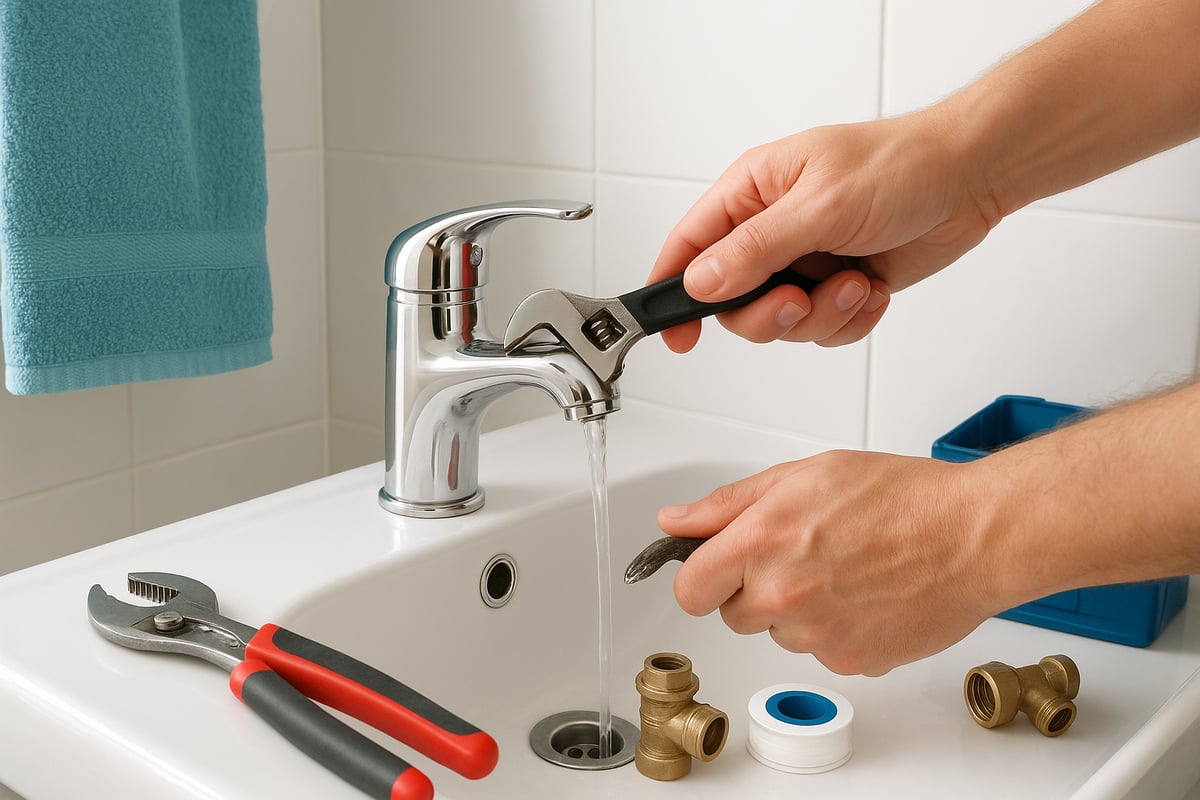
Fixing a Dripping Faucet
A dripping faucet is more than just an annoying sound—it can waste up to 3,000 gallons of water a year. The good news? You can often fix it yourself with a few basic steps as part of your plumbing maintenance work. Here’s how:
- Turn off the water supply under the sink.
- Use a screwdriver to remove the faucet handle.
- Take out the old washer and replace it with a new one.
- Reassemble the faucet and turn the water back on.
If the drip continues, it might be time to replace the whole faucet. Regularly checking and fixing drips helps your plumbing maintenance work go further, saving water and money.
Unclogging Drains Safely
Clogged drains are a common issue in plumbing maintenance work. Instead of reaching for harsh chemicals, try these safer methods:
- Use a plunger to loosen the clog.
- Try a drain snake for tougher blockages.
- Pour baking soda followed by vinegar down the drain, wait 15 minutes, then rinse with hot water.
These steps are gentle on your pipes and good for the environment. If water drains slowly in more than one spot, you might have a bigger problem. In that case, check out our Whole-Home Plumbing Tune-Up Insights for tips on keeping your entire system running smoothly. Always be gentle to avoid damaging pipes during your plumbing maintenance work.
Stopping Running Toilets
A toilet that won’t stop running can waste a surprising amount of water and drive up your bill. For basic plumbing maintenance work, here’s what you can do:
- Lift the tank lid and check if the flapper is sealing properly.
- Adjust the chain if it’s too loose or tangled.
- Replace the fill valve or flapper if they look worn out.
Listen for ghost flushing or a constant trickle. These are signs that parts need replacing. Tackling these small repairs early keeps your plumbing maintenance work on track and your bathroom quiet.
Addressing Low Water Pressure
Low water pressure can make showers less enjoyable and washing dishes a chore. As part of your plumbing maintenance work, start by cleaning the aerators on your faucets and showerheads. Mineral buildup can block the flow, so unscrew the aerator and rinse it under water.
If cleaning doesn’t help, check for leaks under sinks or around pipes. Sometimes, the problem is buildup inside pipes or a bigger issue with your water supply. If you can’t find the cause, don’t worry—just reach out to us by call, chat, or email, and we’ll help keep your plumbing maintenance work simple and stress-free.
Preventing Frozen Pipes
Frozen pipes can burst and cause serious damage, especially during cold snaps. To include this in your plumbing maintenance work:
- Wrap exposed pipes with insulation sleeves.
- Open cabinet doors to let warm air reach under-sink pipes.
- Let faucets drip slightly during freezing weather to keep water moving.
If you suspect a pipe has frozen, turn off the main water supply and gently warm the pipe with a hair dryer. Never use an open flame. Quick action and regular plumbing maintenance work can prevent costly repairs and water damage.
When to Call a Professional Plumber
Have you ever tried to fix a plumbing issue, but the problem just kept coming back? Sometimes, plumbing maintenance work is more complicated than it looks. While DIY fixes are great for small problems, there are times when you really need a professional to step in and save the day.
Signs You Need a Pro
There are some clear signals that it’s time to call in an expert for your plumbing maintenance work. If you notice these issues, don’t wait:
- Persistent leaks that won’t stop, even after you’ve tightened everything.
- Water stains or mold growing on your walls or ceilings.
- Bad smells, like sewer odors, or slow drains all over the house.
- Problems with your water heater such as no hot water, strange noises, or puddles nearby.
- Any gas smells or if you think there might be a leak.
Sometimes, fixing leaks is harder than it seems. For example, in the Mechanical Room Leak Repair Experience, our team had to track down hidden water issues in a busy Midtown Atlanta building. This kind of plumbing maintenance work took special tools and know-how.
If you see any of these problems, don’t risk it. Call a licensed plumber who can find the real cause and fix it safely.
How to Choose the Right Plumber
Picking the right pro for plumbing maintenance work is important. Here’s what to look for:
- Make sure the plumber is licensed and insured.
- Read reviews from other customers to see what their experience was like.
- Ask about warranties and if they can give you a clear price before they start.
- Local experts know Atlanta homes best, so choose someone familiar with our city’s plumbing needs.
A good plumber will talk you through the steps, answer your questions, and never make you feel rushed. If you’re not sure who to call, ask friends or neighbors for recommendations. Remember, choosing wisely can make your plumbing maintenance work much smoother and less stressful.
Fix & Flow Plumbing Co.: Atlanta’s Trusted Plumbing Experts
At Fix & Flow Plumbing Co., we know how important it is to have reliable help when you need plumbing maintenance work done right. Our licensed team handles everything from repairs and installations to emergency response and bathroom remodeling.
We are here for you 24/7, so you never have to face plumbing problems alone. We also offer special discounts for first responders, teachers, active military, and veterans. Need help fast? You can call, chat, or email us anytime with your questions, and we’re always glad to help.
Our satisfaction guarantee means you can trust us to take care of your home, just like we would our own. Let us handle your plumbing maintenance work, so you can get back to what matters most.
Plumbing Trends & Innovations for 2025
Wondering what the future holds for plumbing maintenance work? In 2025, new tech and eco-friendly ideas are changing how you care for your pipes and fixtures. Let’s explore the top trends you’ll see in homes across Atlanta and beyond.
Smart Plumbing Technology
Smart gadgets are making plumbing maintenance work easier and smarter than ever. Imagine catching a leak before it floods your bathroom. That’s what smart leak detectors and shut-off valves do. These tools send real-time alerts to your phone if they sense trouble, so you can act fast.
Smart water usage monitors help you track how much water your family uses. Some systems even let you shut off the water from your phone. According to the Smart Plumbing Fixtures Market Growth, the demand for these devices is booming as more people want to save water and avoid costly repairs.
- Get alerts for leaks or drips
- Control water flow with your phone
- Prevent big problems before they start
If you ever have questions about which smart tools are right for your plumbing maintenance work, you can always call, chat, or email us. We’re happy to help!
Eco-Friendly Plumbing Solutions
Green plumbing is a big deal in 2025. Homeowners are choosing low-flow toilets, faucets, and showerheads to save water with every flush and wash. Tankless water heaters heat water only when you need it, so you use less energy. Some families are even recycling water from sinks and showers for gardening.
The focus on eco-friendly upgrades is more than a trend—it’s a smart move for your wallet and the planet. As highlighted in Water Conservation in Plumbing, water-saving systems and rainwater harvesting are becoming standard parts of plumbing maintenance work.
- Install low-flow fixtures to save water
- Try tankless heaters for energy savings
- Use rainwater for your garden
If you’re curious about rebates or want to make your home greener, just reach out. We love sharing tips!
Materials and Upgrades
Choosing the right materials matters for plumbing maintenance work. Many Atlanta homes now use PEX and CPVC pipes instead of old copper. These newer pipes are flexible, resist freezing, and can handle Atlanta’s changing weather. Upgrading your pipes or fixtures can boost water efficiency, especially during a bathroom or kitchen remodel.
- PEX and CPVC are bendy and tough
- Modern pipes can last longer than older ones
- Remodeling is a great time to upgrade
Not sure what’s in your walls? We’re always ready to help you check and plan smart upgrades for your plumbing maintenance work.
Atlanta-Specific Innovations
Atlanta faces its own plumbing challenges, like hard water and tree roots sneaking into pipes. New root-resistant sewer lines and special filters for hard water are making plumbing maintenance work easier here. The City of Atlanta also offers rebate programs if you switch to water-saving fixtures.
- Use filters to fight hard water
- Choose root-resistant pipes for older homes
- Ask about local rebates for upgrades
If you need advice for your Atlanta home, just call, chat, or email us! We’re always glad to help you with plumbing maintenance work.
Plumbing Maintenance FAQs for 2025
Got questions about plumbing maintenance work? You’re not alone! Here are the answers to the most common things Atlanta homeowners ask us. If you ever get stuck, remember, you can call, chat, or email us any time—we’re always glad to help.
How often should I inspect my plumbing system?
You should check your plumbing maintenance work once a month for leaks, drips, or odd smells under sinks and around toilets. Once a year, get a professional inspection, especially for older homes. For properties with lots of bathrooms, like in this Sorority House System Maintenance Case, regular upkeep is even more important.
What are the most common signs of plumbing problems?
Watch out for low water pressure, slow drains, stains on ceilings or walls, dripping faucets, and musty smells. These are signs your plumbing maintenance work might need attention. Catching these early helps you avoid bigger headaches later.
Can I do plumbing maintenance work myself, or should I always hire a pro?
There’s a lot you can do yourself! Simple jobs like cleaning drains, tightening fittings, or replacing washers are easy for most people. For anything involving pipes inside walls, gas lines, or major leaks, it’s best to call a licensed plumber.
What new plumbing technologies should I consider for my home?
Smart leak detectors, water-saving fixtures, and tankless water heaters are big trends for 2025. According to Plumbing Industry Trends 2025, smart devices can save money and prevent damage. Ask us about what makes sense for your home.
How do I find a reliable plumber in Atlanta?
Look for companies with great reviews, proper licenses, and clear pricing. Local experience matters, especially for Atlanta’s unique plumbing maintenance work needs. We’re always here, and you can reach out by phone, chat, or email.
Are there rebates or incentives for upgrading to eco-friendly fixtures?
Yes! Atlanta and many utility companies offer rebates for installing low-flow toilets, high-efficiency water heaters, and other green upgrades. We can help you find current deals and make the most of your plumbing maintenance work budget.
What should I do in a plumbing emergency before help arrives?
First, turn off the main water valve if you can. Move valuables away from water. Call us, and we’ll walk you through next steps while we send help. Teaching your family these basics is a smart part of plumbing maintenance work.
So, after diving into all these plumbing tips and tricks for 2025, you might be wondering, “Where do I even start?” Or maybe you’re thinking you’d rather have a pro handle the hard stuff—especially if you’ve spotted a leak or want to upgrade to the latest smart plumbing tech. Either way, you don’t have to tackle it all alone. At Fix & Flow Plumbing Co., we’re here to help you protect your Atlanta home, save money, and enjoy true peace of mind. Want to make sure your plumbing’s ready for the year ahead? Just Book Appointment—let’s get your home in top shape together!
